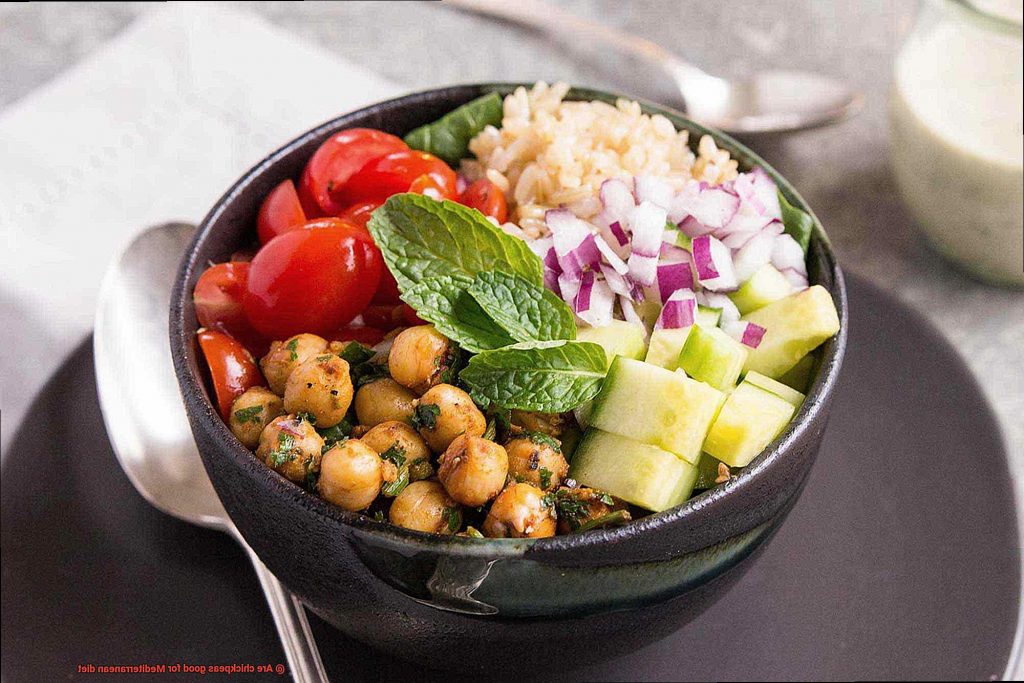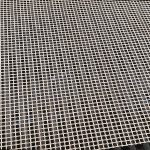Are you tired of feeling like you’re on a tasteless diet that leaves you hungry and unfulfilled? Do you want to enjoy scrumptious, savory meals without compromising your health goals? If this sounds like you, then the Mediterranean diet may be just what you need. This eating plan is based on the mouthwatering cuisine of countries that surround the Mediterranean Sea, such as Italy, Greece, and Spain.
Legumes are an essential part of the Mediterranean diet, and chickpeas are a particularly popular and nutritious choice. These tiny powerhouses offer a plethora of health benefits, from regulating blood sugar levels to reducing inflammation. They’re also loaded with protein, fiber, and vital vitamins and minerals.
So are chickpeas good for the Mediterranean diet? Absolutely. In this blog post, we’ll delve into why chickpeas are an excellent addition to this healthy eating plan. We’ll explore their nutritional perks in detail and give you some creative ideas for incorporating them into your Mediterranean-inspired dishes. So get ready to jazz up your meals with deliciously hearty chickpeas while enjoying all the flavors of the Mediterranean.
Contents
What are Chickpeas?
Chickpeas, also known as garbanzo beans, are a type of legume that have been a staple in Mediterranean cuisine for centuries. These small, round beans have a nutty flavor and slightly grainy texture that make them a versatile ingredient in various dishes. Whether cooked or raw, chickpeas can be used in recipes such as hummus, falafel, salads, soups, stews, and curries.
But chickpeas are more than just delicious. They are also packed with nutrients that make them an excellent addition to any healthy diet. One serving of chickpeas (3/4 cup) contains approximately 11 grams of protein and 10 grams of fiber. This makes chickpeas an ideal food for anyone looking to follow a healthy and balanced Mediterranean diet.
Chickpeas are naturally gluten-free and low in fat, making them a great substitute for meat in vegetarian or vegan diets. They are also a good source of complex carbohydrates that provide energy without causing blood sugar spikes.
In addition to their nutritional value, chickpeas are rich in essential vitamins and minerals such as folate, iron, potassium, magnesium, and zinc. These nutrients play vital roles in maintaining overall health and well-being. For example, iron is essential for transporting oxygen throughout the body, while folate is important for cell growth and development.
Incorporating chickpeas into your diet is easy and delicious. They can be used in a wide variety of dishes and even as a snack on their own. Studies have shown that consuming chickpeas can help reduce the risk of chronic diseases such as diabetes, heart disease, and certain types of cancer.
What is the Mediterranean Diet?
Look no further than the Mediterranean Diet. As an expert on this topic, I’m excited to share with you the delicious and healthy way of eating that is the Mediterranean Diet.
So what exactly is the Mediterranean Diet? It’s a way of eating that has been practiced for centuries by countries surrounding the Mediterranean Sea. This diet emphasizes the consumption of whole, plant-based foods such as fruits, vegetables, whole grains, legumes, and nuts. In addition, it includes lean proteins like fish and poultry while limiting the intake of red meat and processed foods.
But that’s not all – one of the key components of the Mediterranean Diet is the use of healthy fats such as olive oil instead of saturated fats found in butter and other animal products. Plus, it encourages moderate consumption of red wine with meals.
The benefits of the Mediterranean Diet are numerous. Studies have shown that it can reduce the risk of heart disease, stroke, and other chronic diseases. It’s also associated with weight loss and improved mental health. Here are some additional benefits:
- Lower risk of type 2 diabetes
- Improved cognitive function
- Reduced inflammation in the body
- Longer lifespan
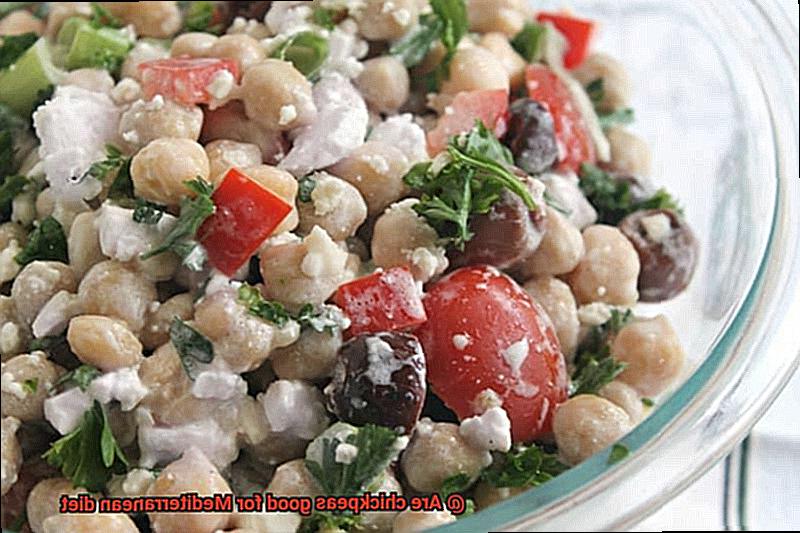
The Mediterranean Diet isn’t just about what you eat – it’s also about how you eat. Meals are typically enjoyed with family and friends and eaten slowly with no distractions. This promotes mindful eating and a more enjoyable dining experience.
Health Benefits of Eating Chickpeas
Also known as garbanzo beans, this legume is packed with nutrients that provide numerous health benefits.
First and foremost, incorporating chickpeas into your diet can help lower cholesterol levels. This is thanks to their high fiber content, which reduces the absorption of cholesterol in the body. This reduction can lower the risk of heart disease and keep your heart healthy.
But wait, there’s more. Chickpeas can also aid in weight loss thanks to their low-fat, low-calorie nature, combined with high protein and fiber content. By helping you feel fuller for longer periods, chickpeas can lead to a reduction in overall calorie intake and help you achieve your weight loss goals.
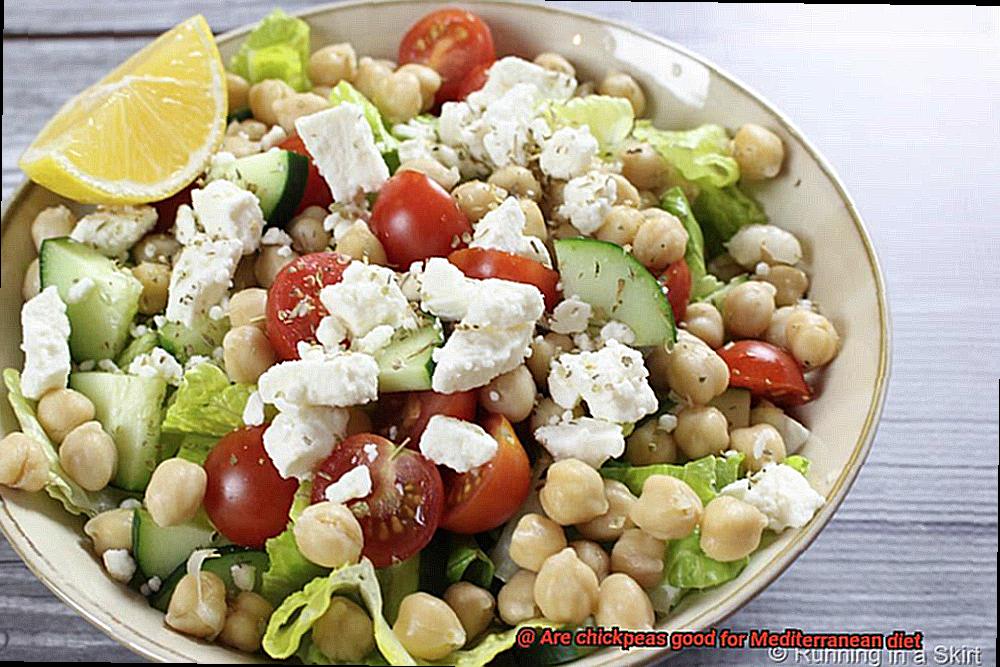
In addition to their heart-healthy and weight loss benefits, chickpeas also promote digestive health. The fiber content in chickpeas can help regulate bowel movements and prevent constipation. Furthermore, the soluble fiber in chickpeas acts as a prebiotic, promoting the growth of healthy gut bacteria and supporting overall digestive health.
So why not add some chickpeas to your next Mediterranean-inspired meal? Whether you’re making hummus, falafel, or a salad, including this legume can provide a range of health benefits. With 15 grams of protein, 12 grams of fiber, and a variety of vitamins and minerals such as folate, iron, and magnesium in just one cup of cooked chickpeas, it’s easy to see why this legume is such a nutritional powerhouse.
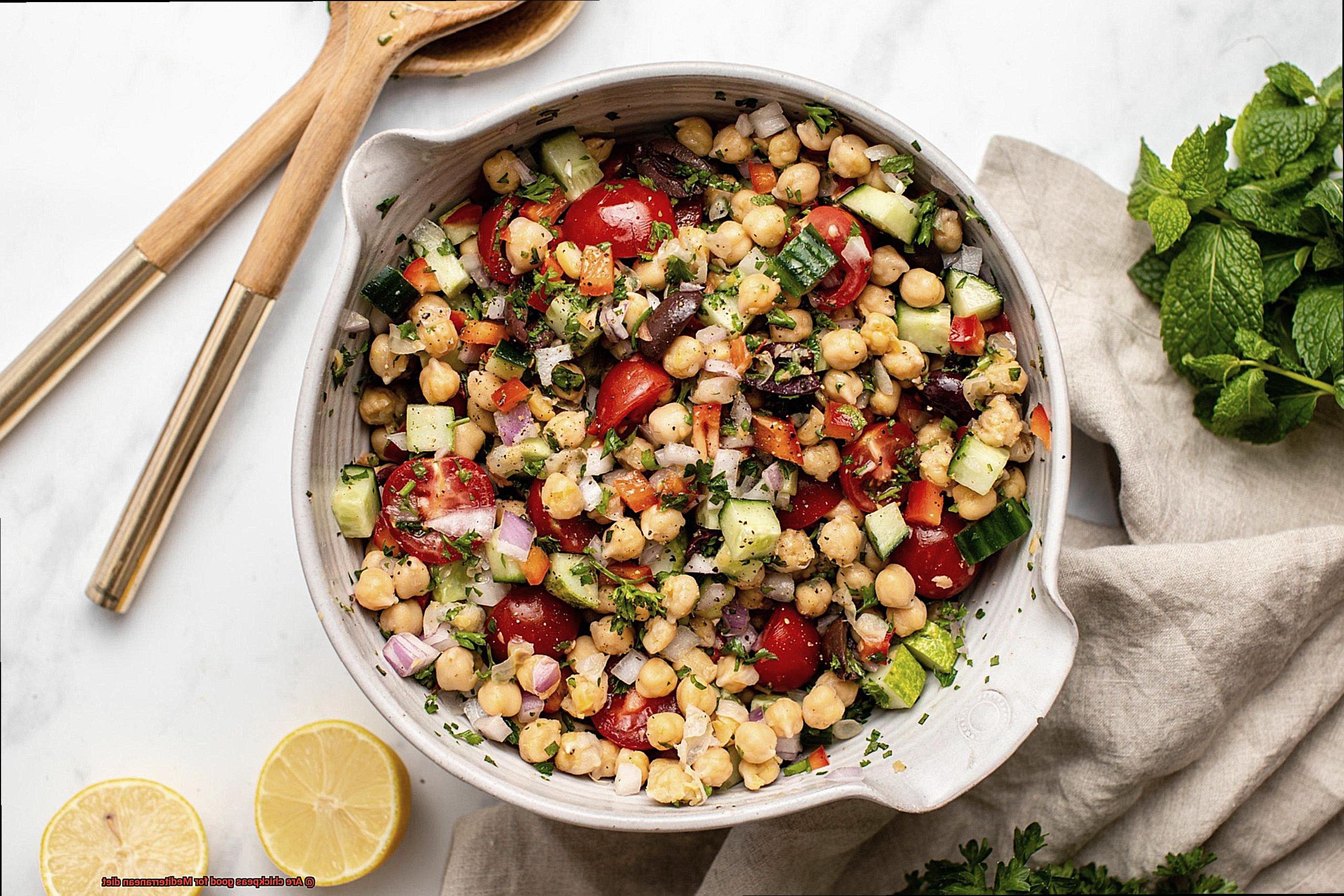
To sum up, here are some of the key health benefits of eating chickpeas:
- Lowering cholesterol levels
- Aiding in weight loss
- Improving digestive health
- Providing a source of protein, fiber, and essential vitamins and minerals
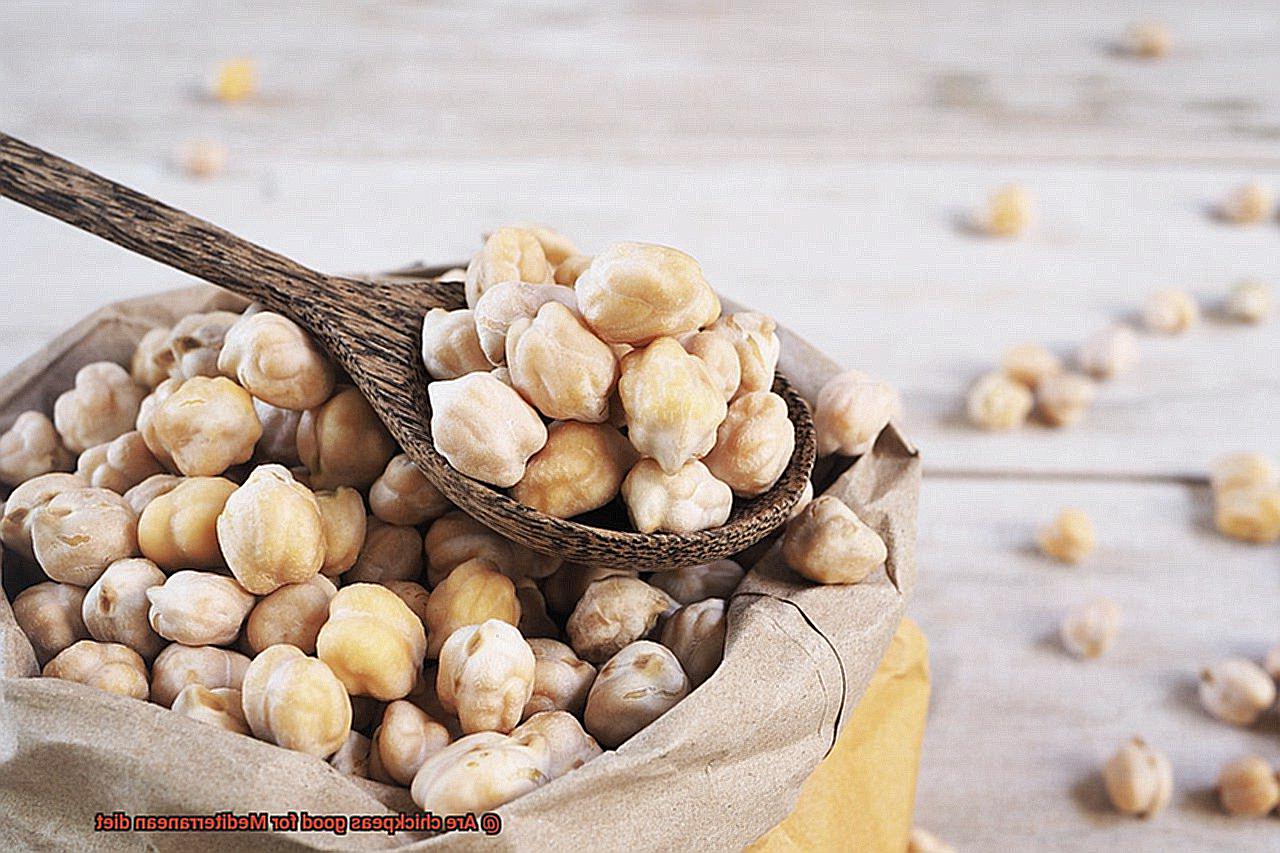
Nutritional Value of Chickpeas
If you want to add a healthy and nutrient-packed food to your diet, look no further than chickpeas. These legumes are not only delicious and versatile, but they also offer a wide range of health benefits that can help you stay healthy and feel great.
First and foremost, let’s talk about protein. Chickpeas are loaded with protein, boasting approximately 15 grams of protein per one cup of cooked chickpeas. In fact, this amount is equivalent to the protein content found in two ounces of meat, making chickpeas an excellent source of protein for vegetarians and vegans who may struggle to get enough protein in their diets.
But that’s not all – chickpeas are also rich in fiber, a nutrient that is essential for maintaining gut health and regulating digestion. Thanks to their high fiber content, chickpeas can help keep you feeling fuller for longer periods, making them a great option for weight management.
When it comes to vitamins and minerals, chickpeas do not disappoint. They are a great source of folate, iron, phosphorus, and magnesium. Folate is especially important for pregnant women as it plays a vital role in the development of red blood cells and can help prevent birth defects. Iron is necessary for the production of hemoglobin in red blood cells, which carries oxygen throughout the body. Phosphorus is essential for maintaining strong bones, while magnesium plays a crucial role in muscle and nerve function.
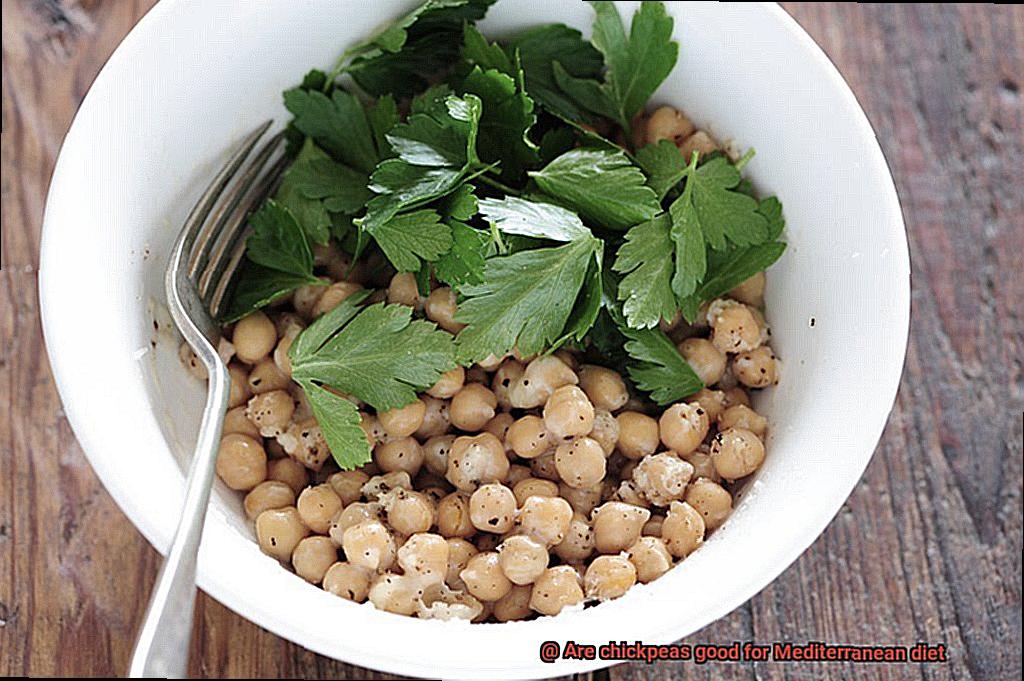
In addition to their impressive nutrient profile, chickpeas are low in fat and calories. Plus, they have a low glycemic index, meaning they don’t cause a rapid spike in blood sugar levels. This makes them an excellent option for those looking to manage their weight or blood sugar levels.
How to Incorporate Chickpeas into the Mediterranean Diet
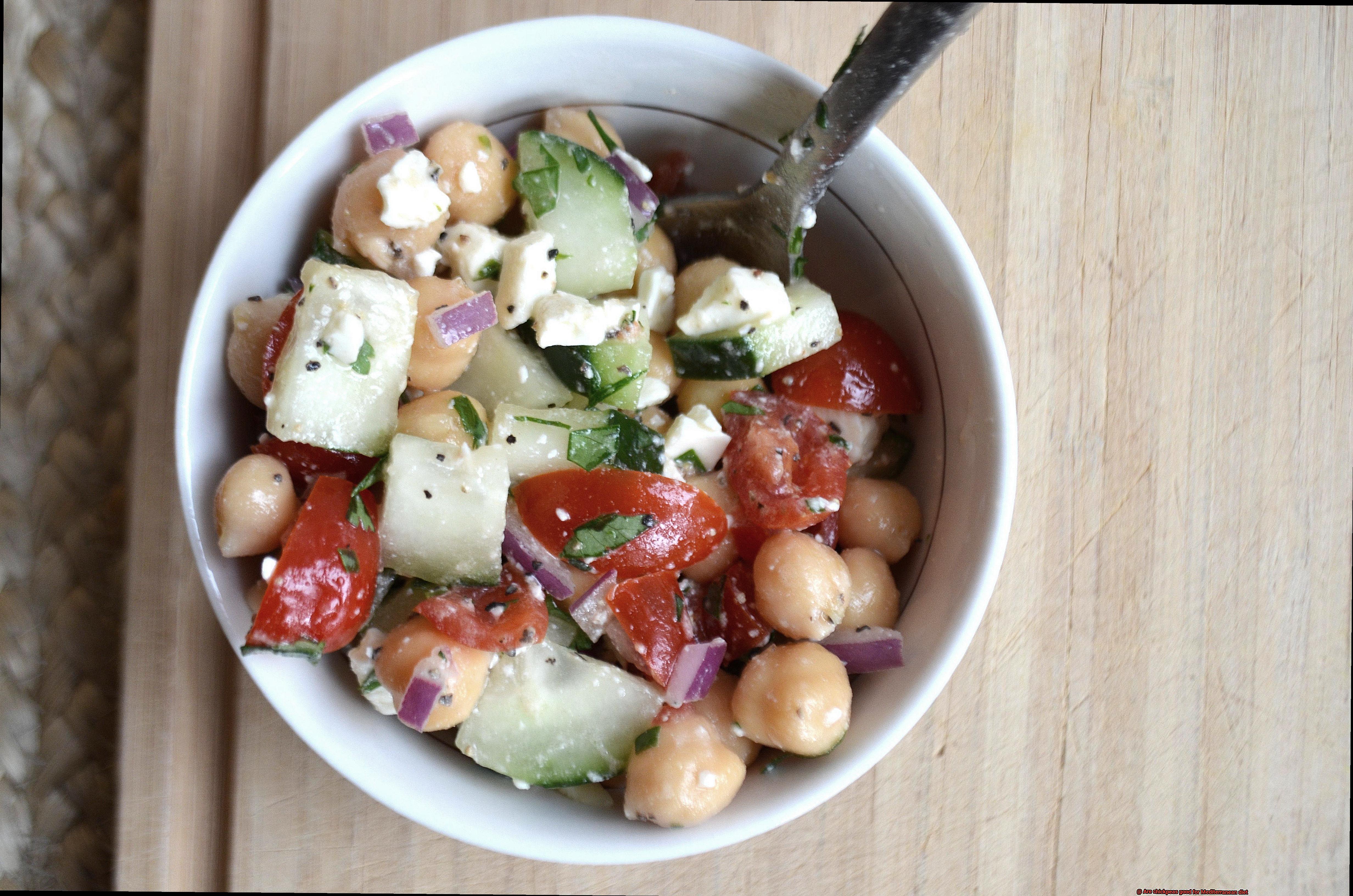
If you want to improve your diet with a healthy and delicious ingredient, look no further than chickpeas. These versatile legumes are a staple food in the Mediterranean diet, which emphasizes whole, unprocessed foods like fruits, vegetables, whole grains, legumes, nuts, and seeds. Chickpeas fit perfectly into this eating pattern due to their nutritional value and versatility. Here are five easy ways to incorporate chickpeas into your Mediterranean diet:
Add them to salads
Chickpeas are an excellent addition to any salad. They add protein and fiber while also providing a satisfying texture. All you need to do is rinse and drain a can of chickpeas and toss them into your favorite greens, vegetables, and dressing.
Make hummus
Hummus is a traditional dip made from pureed chickpeas, tahini, lemon juice, and garlic. It’s a versatile spread that can be used on sandwiches or as a dip for vegetables or crackers. Homemade hummus is easy and delicious.
Use them in soups and stews
Chickpeas are commonly used in Mediterranean soups and stews like chana masala. This Indian-inspired recipe typically includes chickpeas, tomatoes, onions, and spices like cumin and coriander. It’s a hearty dish that’s perfect for chilly days.
Roast them for a snack
Roasted chickpeas make a great crunchy snack or topping for salads. They’re super easy to make – simply toss canned chickpeas with olive oil and seasonings like paprika, cumin, or garlic powder, and roast in the oven until crispy.
Try chickpea pasta
Made from chickpea flour, this pasta has more protein and fiber than traditional wheat pasta while still providing a satisfying texture. It’s perfect for those who want to incorporate more legumes into their diet without sacrificing taste.
Recipes Featuring Chickpeas
If you’re looking for a way to spruce up your meals while enjoying the numerous health benefits of legumes, look no further than chickpeas. As a staple in Mediterranean cuisine, chickpeas are versatile, nutritious, and downright delicious. They’re rich in protein, fiber, vitamins, and minerals, making them an ideal ingredient for vegetarians and vegans. Plus, their low glycemic index means they help regulate blood sugar levels and keep you feeling full for longer.
One of the most popular recipes featuring chickpeas is hummus – a creamy dip made from chickpeas, tahini, garlic, lemon juice, and olive oil. Not only is hummus healthy and easy to make, but it’s also incredibly versatile. Enjoy it with pita bread or veggies as a snack or use it as a spread on sandwiches or wraps.
Another fantastic recipe featuring chickpeas is falafel – a Middle Eastern dish made from ground chickpeas, herbs, and spices. Whether you fry or bake them, falafel balls are delicious served in a pita sandwich or as a topping for salads.
Looking for a light lunch or dinner option? Try making a chickpea salad. This refreshing dish is made with chickpeas, chopped veggies like tomatoes and cucumbers, and dressed with olive oil and lemon juice. Add some crumbled feta cheese or sliced olives for extra flavor.
On chilly nights when you’re craving something more hearty, whip up a chickpea stew. This flavorful dish is made with chickpeas, tomatoes, onions, garlic, and spices like cumin and paprika. Throw in some carrots and potatoes to make it even more filling.
Potential Risks of Eating Too Many Chickpeas
Whether you toss them into stews, blend them into hummus, or sprinkle them on salads, chickpeas are a versatile and nutritious food that can add flavor and texture to any dish. However, it’s important to be aware of the potential risks of consuming too many of these legumes.
One of the primary concerns with eating excessive amounts of chickpeas is the risk of digestive issues. Due to their high fiber and carbohydrate content, some individuals may experience bloating, gas, and discomfort after consuming large quantities of chickpeas. To avoid this, start with small portions and gradually increase your intake over time.
Another potential risk of over-consuming chickpeas is the risk of mineral deficiencies. Chickpeas contain phytic acid, which can bind to vital minerals like iron, calcium, and zinc in the digestive tract and prevent their absorption. If you rely heavily on chickpeas for protein or follow a vegetarian or vegan diet, make sure to balance your intake with other sources of these essential nutrients.
In addition to digestive issues and mineral deficiencies, consuming too many chickpeas can also lead to weight gain. While they are an excellent source of protein and fiber, they also contain calories and carbohydrates. To prevent weight gain, aim for one to two servings of chickpeas per day as part of a well-rounded diet that includes a variety of other whole foods.
Conclusion
To sum it up, chickpeas are a wonderful addition to the Mediterranean diet. These legumes are chock-full of vital nutrients like protein, fiber, and essential vitamins and minerals that offer numerous health benefits. Whether you toss them in salads, soups, stews or whip up some hummus or falafel, incorporating chickpeas into your meals is easy and delicious.
The Mediterranean diet itself is a healthy way of eating that focuses on whole, plant-based foods such as fruits, veggies, whole grains, legumes and nuts while limiting red meat and processed foods. It also promotes the use of healthy fats like olive oil and moderate consumption of red wine with meals. This diet has countless benefits including reducing the risk of heart disease, stroke, type 2 diabetes and improving cognitive function while aiding in weight loss.
However, consuming too many chickpeas can lead to digestive issues or mineral deficiencies due to their phytic acid content. To mitigate these risks, gradually increase intake over time or balance intake with other sources of essential nutrients.
All in all, adding chickpeas to your Mediterranean-inspired dishes is an excellent way to boost flavor and nutrition while enjoying all the benefits of this healthy diet.

